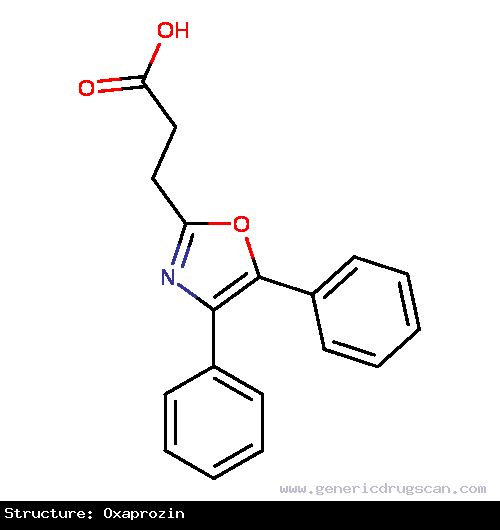Oxaprozin Drug: Indication, Dosage, Precaution, Side Effect , Storage, Category Type and corresponding Brands - www.genericdrugscan.com
Oxaprozin
Drug Status in USA : ApprovedDrug Status in Canada : Approved
pronunciation
pronounced as (ox a proe' zin)
Why is this medication prescribed?
Oxaprozin is used to relieve pain, tenderness, swelling, and stiffness caused by osteoarthritis (arthritis caused by a breakdown of the lining of the joints) and rheumatoid arthritis (arthritis caused by swelling of the lining of the joints). Oxaprozin is also used to relieve pain, tenderness, swelling, and stiffness caused by juvenile rheumatoid arthritis in children 6 years of age and older. Oxaprozin is in a class of medications called nonsteroidal anti-inflammatory medications (NSAIDs). It works by stopping the body's production of a substance that causes pain, fever, and inflammation.
How should this medicine be used?
Oxaprozin comes as a tablet to take by mouth. It is usually taken once or twice a day. Take oxaprozin at around the time(s) each day. Follow the directions on your prescription label carefully, and ask your doctor or pharmacist to explain any part you do not understand. Take oxaprozin exactly as directed. Do not take more or less of it or take it more often than prescribed by your doctor.
What are the precautions to be followed?
Before taking oxaprozin,- tell your doctor and pharmacist if you are allergic to oxaprozin, aspirin, or other NSAIDs such as ibuprofen (Advil, Motrin) and naproxen (Aleve, Naprosyn), any other medications, or any of the inactive ingredients in oxaprozin tablets. Ask your pharmacist for a list of the inactive ingredients.
- tell your doctor and pharmacist what prescription and nonprescription medications, vitamins, nutritional supplements, and herbal products you are taking or plan to take. Be sure to mention the medications listed in the IMPORTANT WARNING section and any of the following: angiotensin-converting enzyme (ACE) inhibitors such as benazepril (Lotensin, in Lotrel), captopril, enalapril (Vasotec, in Vaseretic), fosinopril (Monopril), lisinopril (in Zestoretic), moexipril (Univasc), perindopril (Aceon, in Prestalia), quinapril (Accupril, in Quinaretic), ramipril (Altace), and trandolapril (Mavik, in Tarka); angiotensin receptor blockers (ARBs) such as azilsartan (Edarbi, in Edarbyclor), candesartan (Atacand, in Atacand HCT), eprosartan (Teveten), irbesartan (Avapro, in Avalide), losartan (Cozaar, in Hyzaar), olmesartan (Benicar, in Azor, in Benicar HCT, in Tribenzor), telmisartan (Micardis, in Micardis HCT, in Twynsta), and valsartan (in Exforge HCT); beta blockers such as atenolol (Tenormin, in Tenoretic), labetalol (Trandate), metoprolol (Lopressor, Toprol XL, in Dutoprol), nadolol (Corgard, in Corzide), and propranolol (Hemangeol, Inderal, Innopran); diuretics ('water pills'); glyburide (Glynase, Micronase); lithium (Lithobid); and methotrexate (Otrexup, Rasuvo, Trexall). Your doctor may need to change the doses of your medications or monitor you carefully for side effects.
- tell your doctor if you have or ever had asthma, especially if you also have frequent stuffed or runny nose or nasal polyps; heart failure; swelling of the hands, feet, ankles, or lower legs; or kidney or liver disease.
- tell your doctor if you are pregnant, especially if you are in the last few months of your pregnancy, you plan to become pregnant, or you are breastfeeding. If you become pregnant while taking oxaprozin, call your doctor.
- talk to your doctor about the risks and benefits of taking oxaprozin if you are 65 years of age or older. Older adults should take lower doses of oxaprozin for only a short time period because higher doses used regularly may not be more effective and are more likely to cause serious side effects.
- if you are having surgery, including dental surgery, tell the doctor or dentist that you are taking oxaprozin.
- plan to avoid unnecessary or prolonged exposure to sunlight and to wear protective clothing, sunglasses, and sunscreen. Oxaprozin may make your skin sensitive to sunlight.
What are possible side effects of this medication ?
Oxaprozin may cause side effects. Tell your doctor if any of these symptoms are severe or do not go away:- diarrhea
- constipation
- vomiting
- gas or bloating
- drowsiness
- difficulty sleeping
- confusion
- depression
- dizziness
- headache
- ringing in the ears
- unexplained weight gain
- shortness of breath or difficulty breathing
- swelling in the abdomen, ankles, feet, or legs
- fever
- blisters
- rash
- itching
- hives
- swelling of the eyes, face, lips, tongue, throat, or hands
- hoarseness
- difficulty breathing or swallowing
- yellowing of the skin or eyes
- lack of energy
- excessive tiredness
- upset stomach
- loss of appetite
- pain in the upper right part of the stomach
- flu-like symptoms
- pale skin
- fast heartbeat
- cloudy, discolored, or bloody urine
- back pain
- difficult or painful urination
Oxaprozin may cause other side effects. Call your doctor if you have any unusual problems while taking this medication.
How to store the medication and dispose it of after its use later?
Keep this medication in the container it came in, tightly closed, and out of reach of children. Store it at room temperature and away from excess heat and moisture (not in the bathroom).
Unneeded medications should be disposed of in special ways to ensure that pets, children, and other people cannot consume them. However, you should not flush this medication down the toilet. Instead, the best way to dispose of your medication is through a medicine take-back program.
Drug Category/Class
- Anti-Inflammatory Agents, Non-Steroidal
- Musculo-Skeletal System
- Antiinflammatory and Antirheumatic Products, Non-Steroids
- Antiinflammatory and Antirheumatic Products
- Propionic Acid Derivatives
- Cytochrome P-450 CYP2C9 Inhibitors
- Cytochrome P-450 CYP2C9 Inducers
- Propionic acid derivatives
| Prescribed | Used to relieve the inflammation, swelling, stiffness, and joint pain associated with rheumatoid arthritis and osteoarthritis. |
| Weight : | 293.3166 |
| Structure | Oxaprozin |
 | |
| Formula | C18H15NO3 |
Oxaprozin has 2 Brands listed
| Macprox (600 mg) | Oxapro (600 mg) |
Search Generic Drugs alphabetically
